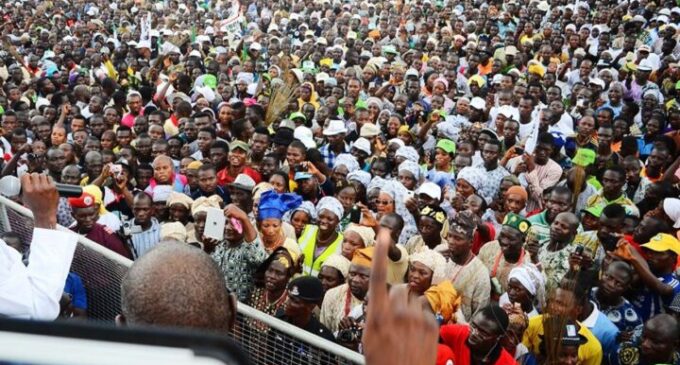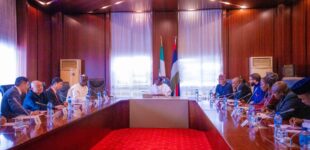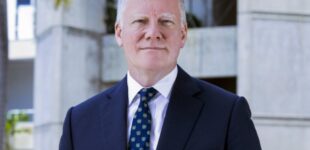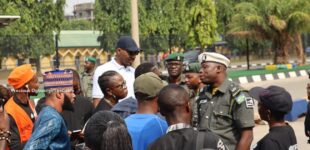You underestimate ‘party structure’ at your peril

If you are big on social media, you could already call the 2023 presidential elections for Mr Peter Obi of the Labour Party. Indeed, he is making some impact, whether we agree with his politics or not. Many young and vocal people I know, and many who would not want to have anything to do with politics (who would usually farm out the responsibility to someone else), are strongly backing him.
The crowd behind Obi has turned out to be quite quarrelsome taking down viciously anyone who does not agree with their opinions to the level of demonizing those they believe to be in opposition. I have my fair share of their excoriation, for indeed they have no time and no patience for long, convoluted explanations – which indeed are necessary for the right analysis to be done in a democracy, according to those who invented the idea. But that is a discussion for another day really.
Also, to be discussed on another opportune day is why the Obi phenomenon is catching on among the urban young especially. They have every right to be disenchanted with the status quo. The oldies have messed up ‘bigly’ over time, so anyone who sounds different may be attractive. Obi talks a good game – especially when it comes to lamenting about and comparing Nigeria with other nations with copious statistics. He has been called out on some of the statistics, but I am not one of those who believe he lies. You can only keep so many numbers in your head. However, when it comes to envisioning a new future for Nigeria, and responsibly allocating responsibility for where we are, I believe the gentleman can do much better.
The concern of this writeup though, is that many of the young Obi supporters are discounting the sheer import of having a party structure. Like some of us did in 2019, many of these supporters, including Obi and the Labour party themselves, have alluded to the usual refrain that human beings are the structure. I have learnt. And in building a political party and contesting for the office of president in 2019, I acquired some bragging rights in addition to considerable knowledge of how things work. Human beings may form the structure for Obi on social media, but it reduces on the ground in some urban areas. But as you drill down to the real Nigerian society, the human party structure thing wanes almost into nothingness.
This is how I explained the reality of party structure to some friends on WhatsApp:
There are 774 local governments in Nigeria and almost 10,000 wards. Each ward is made up of between six to 10 villages or small towns. Some are made up of urban areas. In the early 1990s, President Ibrahim Babangida created two political parties … a little to the right and left. He funded them and called them Social Democratic Party (SDP) and National Republican Convention (NRC). He built standard structures (offices) for them in all local governments. Those structures are still there though taken over by state governments today. In 1998, Abdulsalam funded the key political parties with billions to show integrity that the military was leaving. The People’s Democratic Party (PDP) was a major beneficiary as they brought Obasanjo on board. Alliance for Democratic and the rest also benefited greatly at that time for it had been written into the Nigerian constitution that government will fund political parties.
That funding continued, though reduced, until 2011 when the PDP decided to scrap the idea as it got ready to rule for 60 years. I believe that the PDP felt sufficiently comfortable and wanted to consolidate its position. It was however a more decent way of pulling the rug from underneath new political ideas than what APC did in 2020 by militarily deregistering parties and getting the courts behind an unconstitutional action just because they could.
So, today perhaps only the two large parties have offices in 10,000 wards, 774 LGs, 36 states and FCT. In each ward and local governments are chairmen and secretaries and their deputies and a handful of really committed members – some of whom see the party work as their legitimate work in an environment of high unemployment. They meet regularly and are occasionally funded – sometimes, money comes regularly depending on how they assert themselves. The funding that comes in from governors and their lackeys may have, however, led to situations where many of these structures are fraught with factionalisation and infighting (a wise upstart political party may look at exploiting this but has to rely on more than nice words or even saying bad things about the status quo). This constant funding aids mobilisation during elections. And of course, they are conduits for disbursement of bungs on election day. Each of the 178,000 polling booths thus gets well-funded for elections.
I am yet to see the mass mobilisation that can dislodge this sedimentary formation that sits atop Nigerian politics, though I’d be happy to see it dislodged. It will take tremendous amounts of investments, trust, money, time, and even intellectual engagements at all levels to get this off, all the while fighting betrayers and deceivers and interlopers, and unserious pretenders. And mind you, most of the 10,000 wards are in far-flung places that are poverty and illiteracy wracked – effectively beyond the coverage of the almost-ubiquitous social media. Our people cannot understand all the fine grammar beyond Lagos, Port Harcourt, Owerri, Awka, Abuja, and a few other state capitals. All we have to do is activate our imagination. All the farmers, our uncles and old aunties we abandoned in the village. Those ones we avoid seeing when we visit home. The ones we say are witches and wizards. The drunkards and ne’er-do-wells, the ones who couldn’t make it far with their education or lack of it. The ones we complain loudly to when they call us for money. And of course, we have the millions of honest folks who have stayed back in many villages so that they may farm to fulfil our palates in the cities…. All those millions have found refuge in these structures.
On the side of party structure is history, time, constant funding, add illiteracy and poverty, and the cognitive bias by which human beings are naturally resistant to change or adopting new things out of the blues. The Obi phenomenon can give it a good try, but I believe this kind of coup requires the investment of time to show how serious you are. He has a couple of real disadvantages that may reduce how far his wildfire may go on the first try. One of those is the naivety of most of his supporters whose newness in political excitement they have interpreted as the right to bully others who may not have seen the ‘light’. I’ve seen folks lately who repented from their brief spell of Obiism after careful consideration away from the gaslighting. Some have decided to stay away entirely having not found anyone who caught their fancy.
Another downside is that Obi has only borrowed a political party, which comes with baggage. This means that he is likely to hop off if he doesn’t win, when glory may be only at the end of another four years of investment of time, intellect, heart, perseverance and money. I know that he does give ‘shishi’, contrary to the thinking of his wild young followers. He has to be ready to give a lot more ‘shishis’ that may end him up in the realm of the same old politicians that we like to blame for Nigeria’s ills. For it takes billions of shishis to gain the attention of hungry, deprived folks all over Nigeria. Democracy is indeed expensive everywhere in the world. I read one disgruntled labour leader saying that existing labour leaders in Nigeria are APC members and I did a double-take. That must indeed be true. How do you attain labour leadership without being corralled into the ruling party? You will even join willingly. Government must have you on side. Those guys are unlikely to go out of their ways to mobilise for our man.
We tried to build a party structure in the party that I led and co-formed (ANRP – Abundant Nigeria Renewal Party), starting from December 2016. But I realised early on the limits of youth power as we had envisaged. We couldn’t drill below the state level, and only in a few states, we managed to create LG structures. We couldn’t show much presence at the ward levels. Even our state and LG structures were rather feeble. Many of the guys who accepted positions at federal, state and LG levels, upon whom we really relied for sacrifice and mobilisation, simply did not show up for work. Mobilising funds for stuff was a job of work. We sometimes got some financial support from diasporan guys and just a handful of locals. The vast majority were either silent, unsupportive at this level, or indeed needy – such that we had to support them.
I did an article years ago about how much money is needed to sustain party meetings at every level for a considerable period of time so as to really cause a revolution. For you cannot tell a village carpenter or market woman to leave their duties for a whole day to come and listen to a messiah for free when their survival is daily. So, money is important in building structures. You must give shishi. At best, you assemble very kind people but must feed them and buy them drinks or pay for their transport. That costs good money (and you will usually be cheated by the same Nigerians shouting ‘The messiah has come!’). Yet, this must be sustainable over at least four years to grab their attention. Everybody is looking for a better life. So, they want to put a party in power that will come back to them and favour them, give them positions and make life better.
You have to be able to fund party offices at these levels. 10,000 wards, 774 local governments, 37 states and the federal. You may get donations but that cannot cover all. Conflicts must arise as to who contributes more and who gets more benefits which must be urgently resolved. For a small party such as ours, some of these issues were almost insurmountable. A presidential candidate cannot ignore the state of his party – except you want to be a Buhari, a dissembler. Before election day, your electoral representatives (hundreds of thousands of them) must undergo training which needs to be paid for. On election day, you need at least two people in 178,000 polling booths. The going rate in 2019 for effective parties was N5,000. That is almost N900 million in one day for only the presidential election. We had an experience at the 2018 Ekiti guber elections in ANRP where our electoral officers who should man the polling booths abandoned their jobs and went chasing more money from those who paid higher. In fact on that day, many Nigerians vote multiply for different parties. They have to go home rich that night. Who is checking what if you are not in Abuja municipal council or Lekki? The atmosphere on election day is different. Outside the main cities, any prim and proper person sticks out like a thumb and has to scurry home else meeting with maiming or worse. Even the security services are in on it. So, it begins to look like an outsider like Obi is on a self-delusion. In the South-East though, if elections are not disrupted, another Nigerian reality will work for Obi. South easterners will rally behind their son certainly. He can make a statement there.
In the final analysis, the same issues Obi has tried to avoid by defecting from the PDP will still confront him. He has to invest at least another four years. See how long Buhari had to try (and he doesn’t have money). Obi has to maintain his Nigerian-ness and encourage his supporters to remain Nigerians – not something else if they lose the elections. He has to basically take ownership of his political party and show that he is an administrator, working with his chairman. The presidency is not a 100 metres dash. Or is it? He must have to engage increasingly with the grassroots by knowing those 10,000 wards and his message to them cannot be about China, Bangladesh, Egypt and the rest. He must have understood that no elite in Nigeria can be exonerated from the historical fact of our people’s perennial, generational, and multidimensional poverty and illiteracy – least of all himself, an importer/banker/billionaire.
And he will have to give more than a shishi.
Views expressed by contributors are strictly personal and not of TheCable.











There are no comments at the moment, do you want to add one?
Write a comment